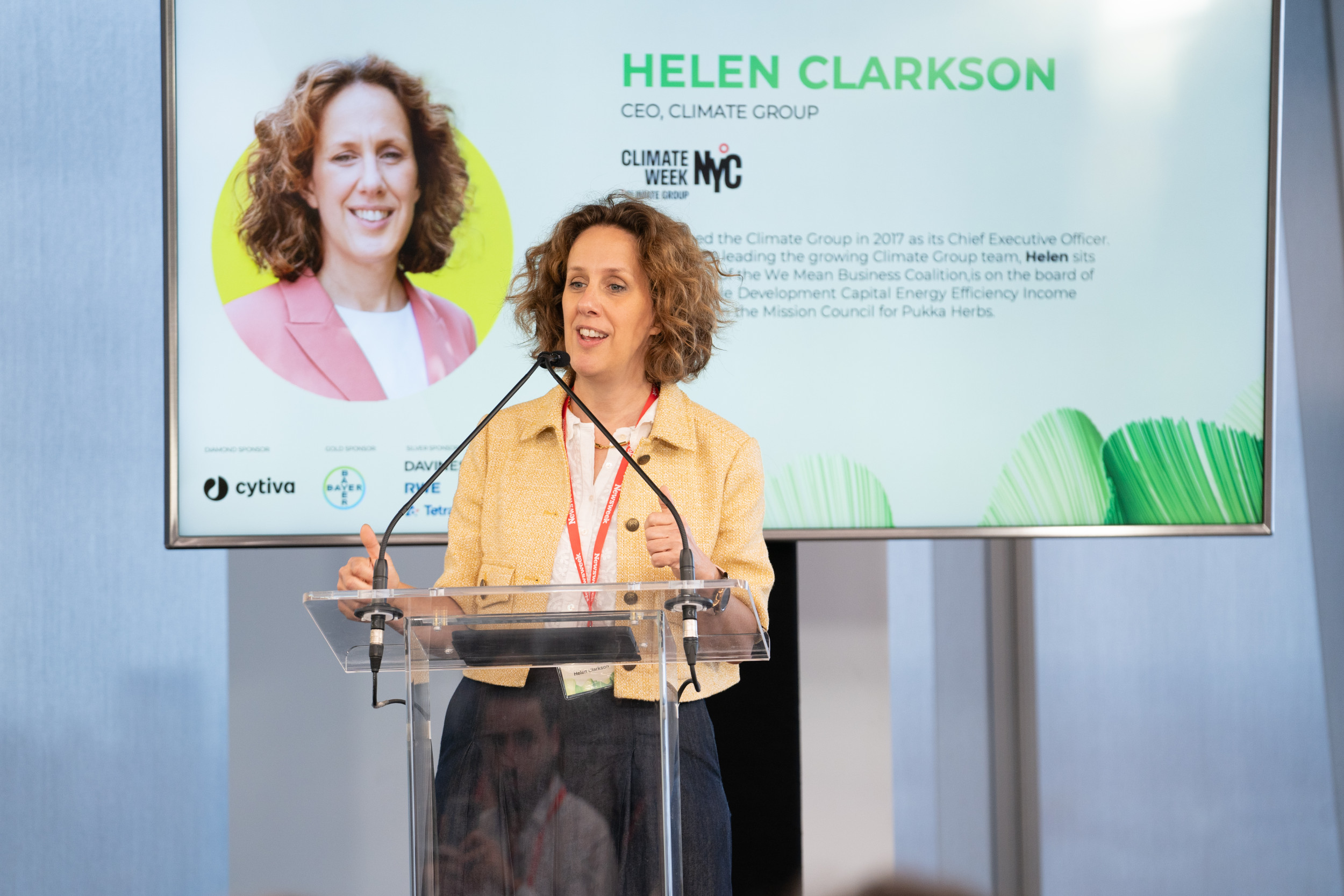During this year’s Climate Week in New York City, environmental leaders gathered at the Newsweek office in One World Trade Center on Wednesday for a panel to discuss the transition to cleaner energy across various industries.
This roundtable took an in-depth look at practical ways different business sectors, including biopharma, beauty, agriculture, packaging and sustainable fuels, are innovating and collaborating to lower carbon emissions and to limit their environmental impacts across the supply chain.
The afternoon began with two fireside chats moderated by Newsweek’s Environment and Sustainability Editor Jeff Young. The first 15-minute conversation was with Emmanuel Abate, the president of genomic medicine and head of sustainability at Cytiva, a Diamond sponsor of the event. The second conversation was with panelist Max Dougherty, the vice president of business development for Bayer Ecosystem Services, a Gold sponsor.
Climate Group CEO Helen Clarkson delivered opening remarks, welcoming the audience to the event.
Yekaterina Gyadu
Climate Group coordinates the 900 events during Climate Week NYC – an annual conference in partnership with the United Nations General Assembly that, in coordination with the United Nations and the City of New York, brings together global leaders in business, politics and science to discuss innovations for a better planet and innovations related to climate change. Newsweek is an official media partner of Climate Week NYC.
Clarkson said the theme of this year’s Climate Week is “It’s Time” and encouraged companies start on their longer-term 2030 and 2050 goals today.
“It’s clear that we can’t waste another year, and that work needs to happen whichever sector you’re in,” she said. “Those are the sort of actions that really are the pillars of the green transition. … We need to innovate, collaborate and we’ve got to treat this crisis with urgency.”
The main event of the afternoon was the discussion moderated by Newsweek‘s Young and featuring Bayer’s Dougherty; Scott Raubenstine, vice president of agricultural services for Perdue Agribusiness; Davide Bollati, chairman of Davines Group; Gilles Tisserand, vice president of climate and biodiversity at Tetra Pak; and Etosha Cave, co-founder and chief science officer of the carbon transformation startup Twelve.
Davines, Tetra Pak and RWE were also Silver sponsors of the event.
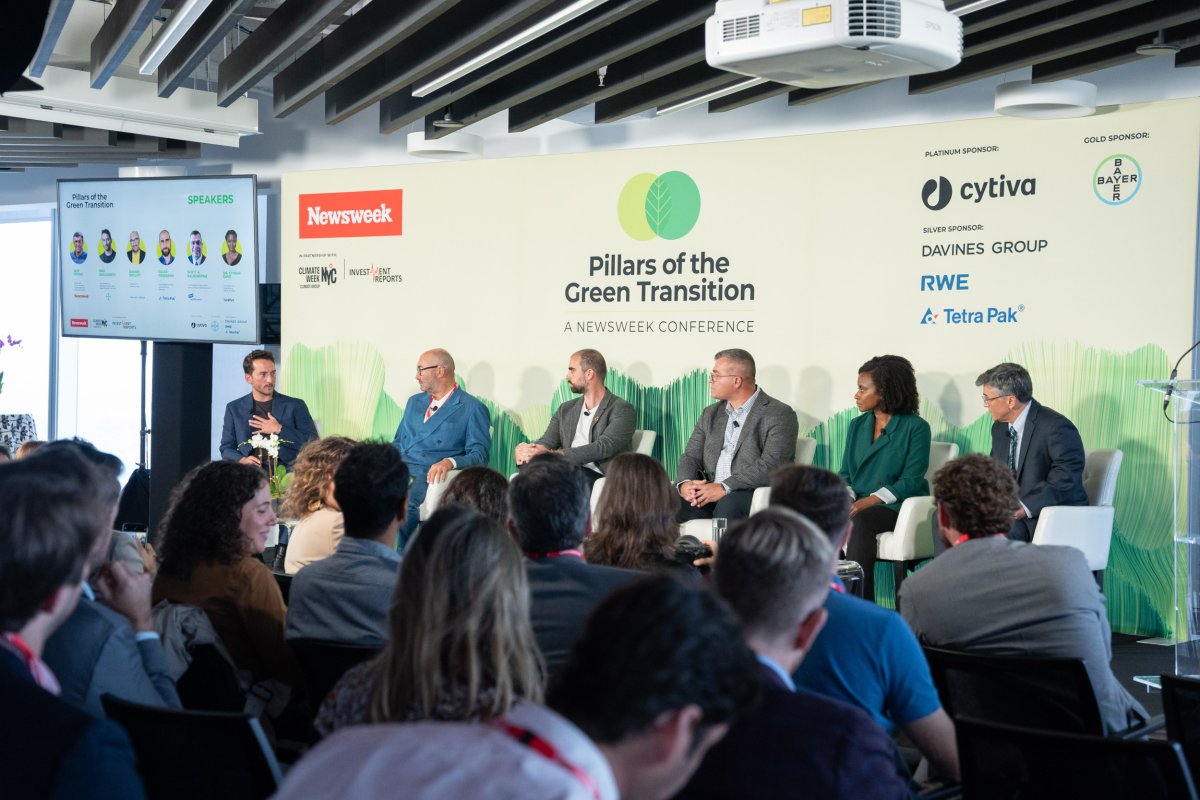
Yekaterina Gyadu
While these panelists represent different sectors and operate in different countries, Young noted there are commonalities, cross-cutting themes and similar challenges that they are tackling as they work towards a green transition.
The conversation began with each panelist disclosing the breakdown of the emissions along their respective supply chains.
Greenhouse gas emissions are categorized by “scopes.” A company’s own direct operations and activities are Scope 1, and the company’s emissions through the energy it purchases and uses qualify as Scope 2. All other emissions not directly produced by the company or the result of activities within their control are considered Scope 3, which is responsible for most emissions. This encompasses emissions up and down a company’s supply chain, including when a company buys, uses and disposes of products from suppliers.
Each of the panelists said that they have made significant strides in reducing greenhouse gas emissions, they all revealed that majority of their emissions remain Scope 3, which Bollati of Davines Group described as a “big challenge” that requires collaboration and collective solutions to reduce.
“The planet is only one living organism, one breeding organism, so radical interdependency means that every single action, every single input has a consequence at a planetary level,” the founder said.
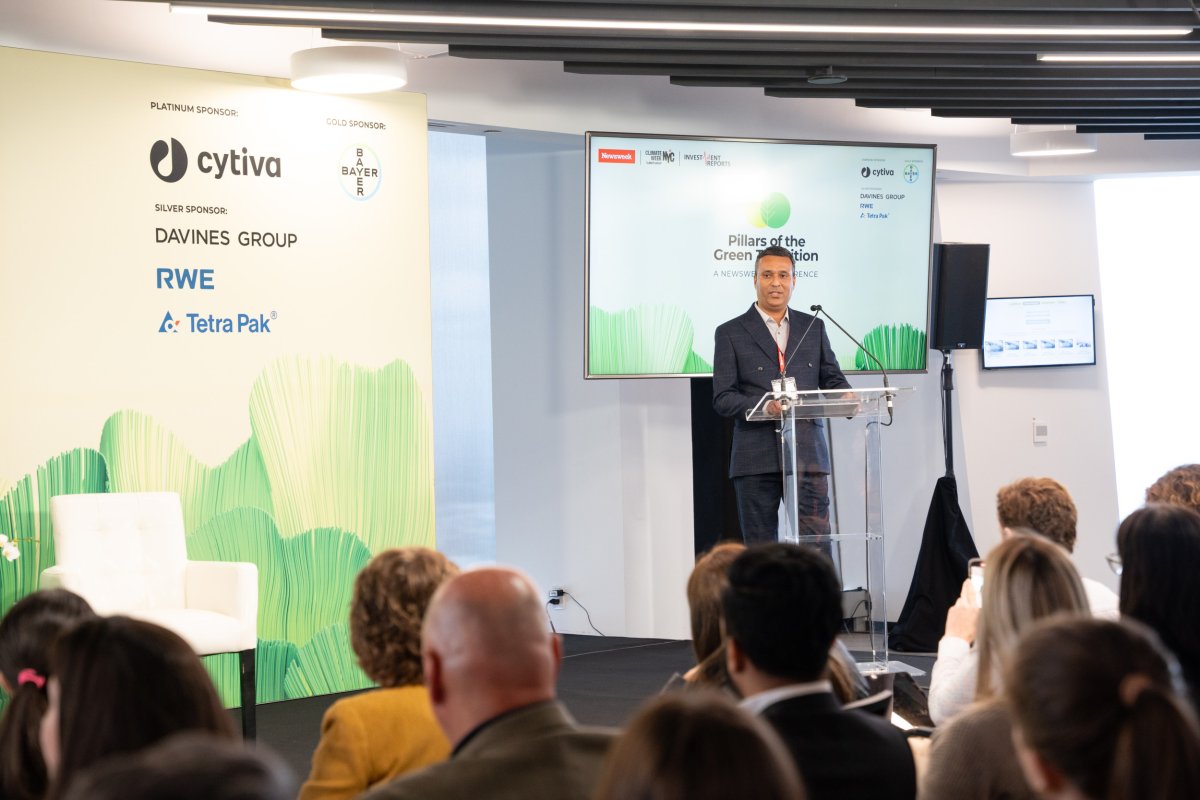
Yekaterina Gyadu
Collaboration was another major theme of the panel; each of these companies works as part of a larger value chain to deliver products to consumers. And, once you learn how to measure your impact, Bollati added, interdependence becomes critical.
That connectedness is particularly true for agriculture businesses
From the farmers who provide the grain to feed the chickens to the consumers who eat the product, Perdue’s Raubenstine said working with his supply chain up and down stream allows Perdue to better support farmers, produce higher-quality products and educate the public on climate initiatives.
“We want to bring that collaboration and look at it a little differently from a supply chain perspective,” he said. “We’d like to invite other supply chains within our supply chain to provide that full traceability from seed to fork.”
Biopharma company Bayer is a key partner to Perdue, with Bayer Ecosystem Services provides a digital ecosystem to track data and ensure farmers can be profitable while utilizing farming methods to ensure longevity and sustainability, Raubenstine explained.
Dougherty, who leads Bayer’s carbon and regenerative agriculture venture, said regenerative farming practices can deliver “very clear impacts” in terms of emissions reduction by eliminating the need for energy-intensive tilling practices, sequestering carbon into the soil and improving water usage to cultivate healthy soil.
Dougherty added that when it comes to a challenge as big as climate change and food security, the agri-food industry has to “think holistically.”
This comes by bringing together like-minded stakeholders to encourage everyone – from farmer to consumers – to adopt more sustainable practices.
Perdue’s Raubenstine said it’s important to listen to farmers, business-to-business customers and consumers and educate them on climate action. For example, he said when food companies understand their customers’ eating habits and portion sizes packaging waste can be reduced.
“Everybody in this room has a role in climate action,” he said. “Everybody can take action and be responsible for intervention moving forward. And I think being able to listen and educate and learn and share those learnings transparently through the supply chain, and that’s what our customers are asking for.”
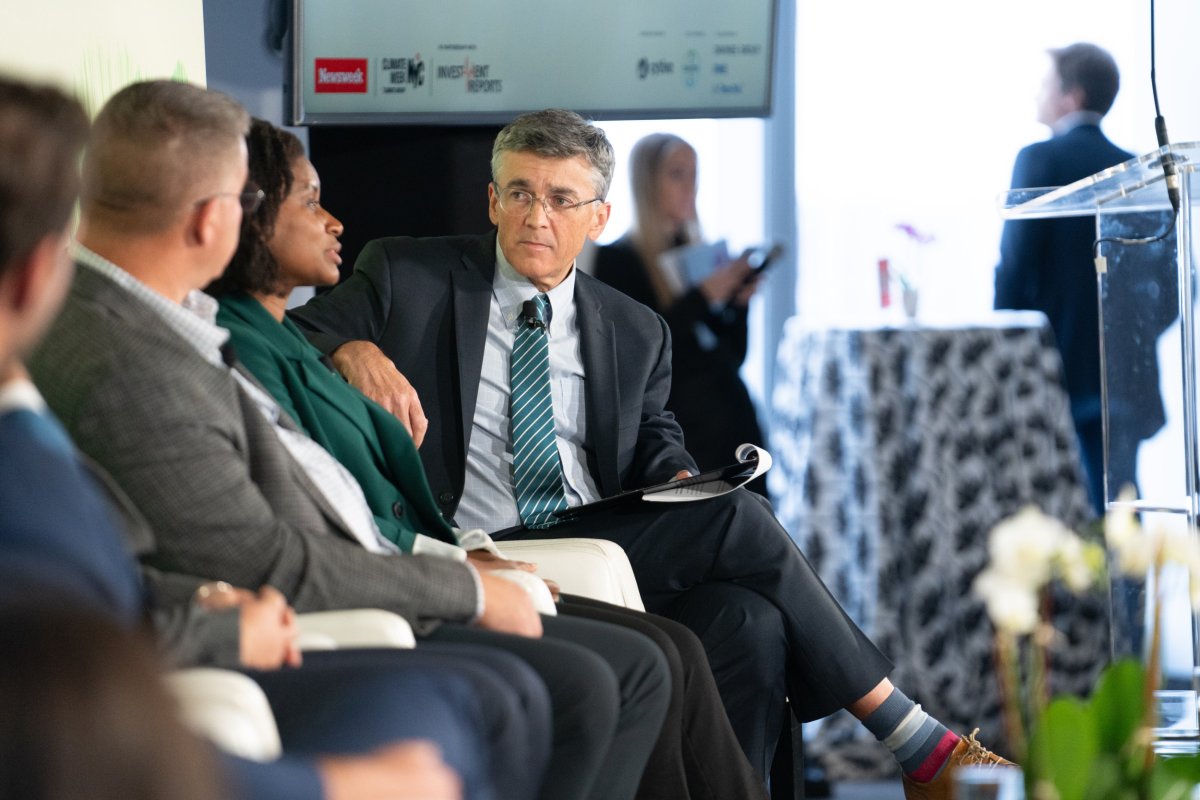
Yekaterina Gyadu
Regenerative agriculture might be the key to a “re-imagination and re-augmentation” of the entire production system to “turn climate on its head in the context of agriculture,” Bayer’s Dougherty said.
“Agriculture has to be a critical part of the solution for fighting climate change,” he said. “The way we feed ourselves globally accounts for anywhere between a quarter to a third of global greenhouse gas emissions. But what makes agriculture so unique is what we were talking about earlier; it’s not only a contributor today to our greenhouse gas profile, but it actually has the potential to be a solution.”
Tisserand, of Tetra Pak, calls his packaging company the “hidden middle” part of the agriculture value chain.
The company designs better food packaging for highly perishable products, like dairy, to reduce food waste while ensuring food gets delivered to consumers in a way that is quick, safe and affordable.
The solutions the company provides, therefore, can reduce the use of energy and water as well as food waste and decarbonize the food value chain.
“I keep on hearing during Climate Week [about] the hard-to-abate sectors,” he said. “Well, food processing is not a hard-to-abate system. Solutions are there, but we need also push from governments to enable that transition, to get the financing right.”
Those solutions include the work being done at Twelve to make an industrial carbon cycle that mimics the work of plants and trees – taking carbon dioxide from the air, converting it to sugars and releasing oxygen.
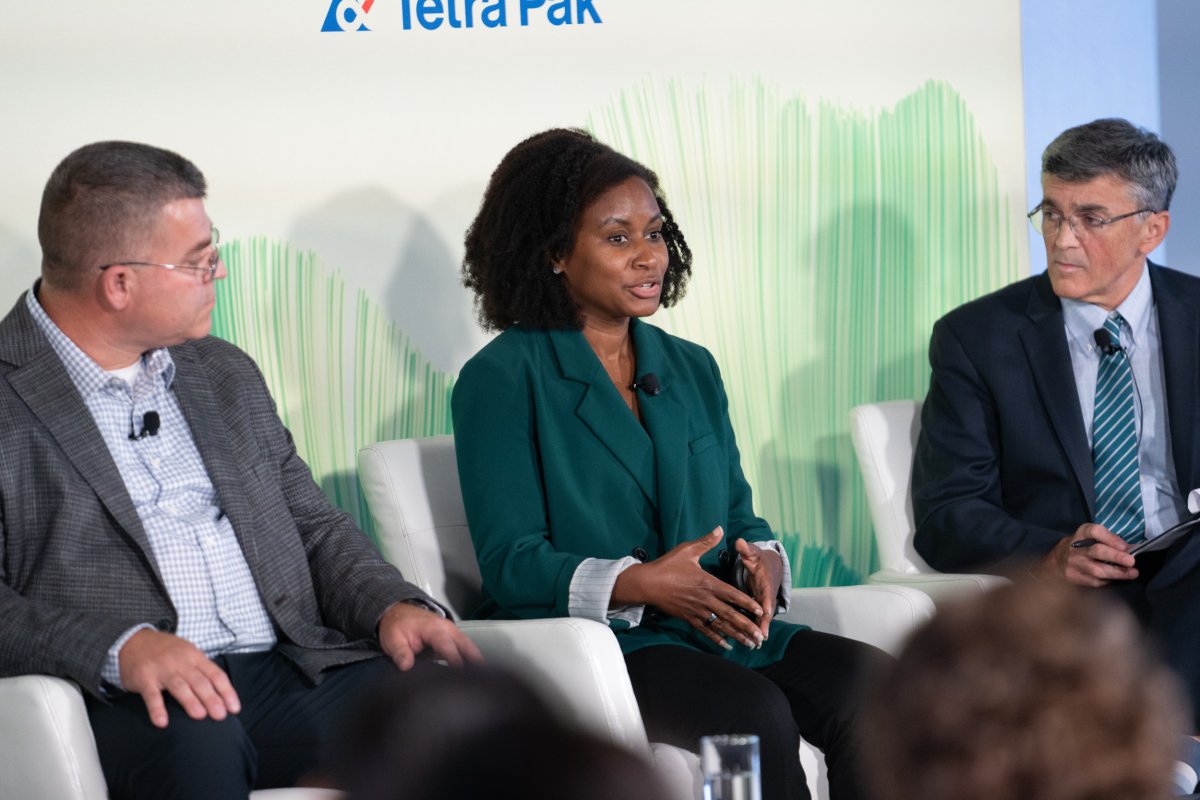
Yekaterina Gyadu
At Twelve, they use water and renewable electricity to turn CO2 into new molecules that can be used for sustainable fuel for aircraft and ships.
Co-founder and Chief Science Officer Etosha Cave said that the ethos of the company is that belief that their technology can grow the economy and support the supply chain while being sustainable.
She said she’s hopeful for the future of climate technology.
“We’ve solved many planetary problems before we can do it again,” she said. “We’re different companies at different scales, different industry, we’re all focused on that same mission. Humans have focused on missions before in the past, and we’ve succeeded.”
